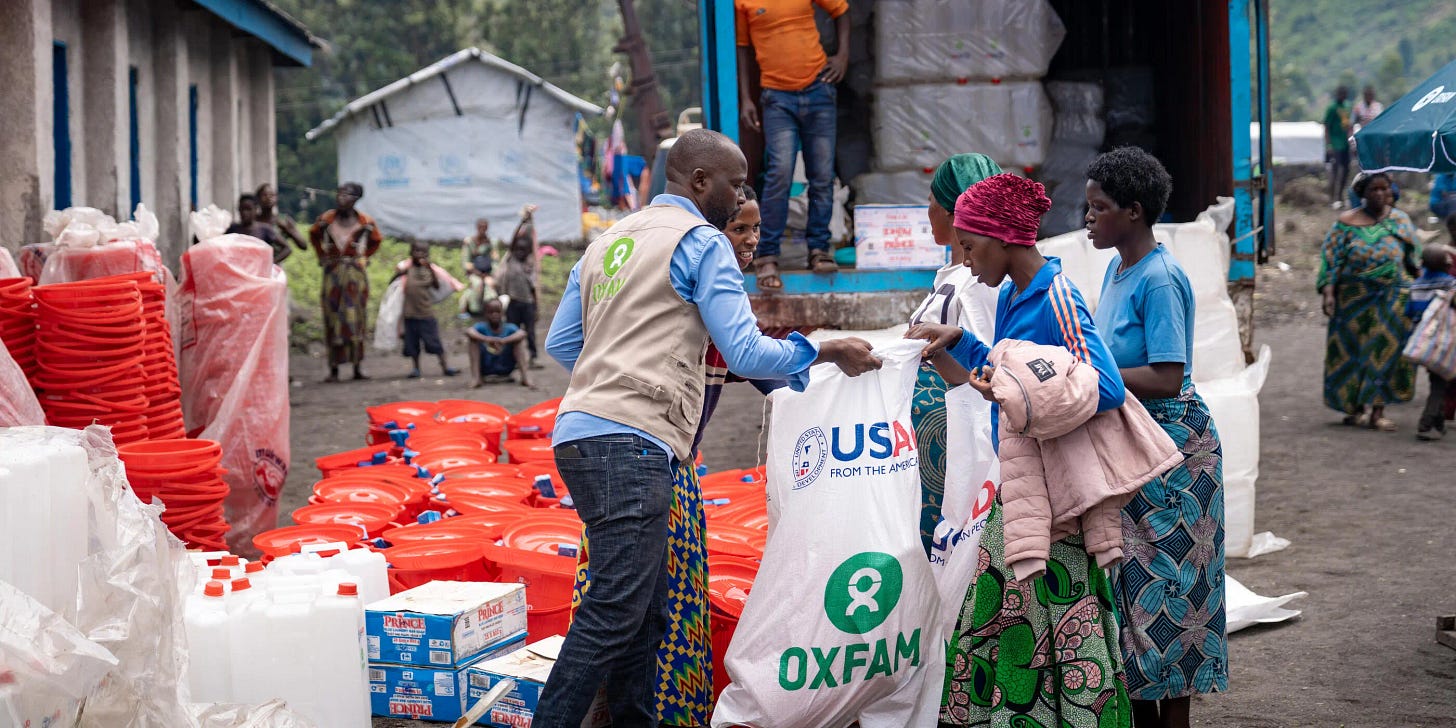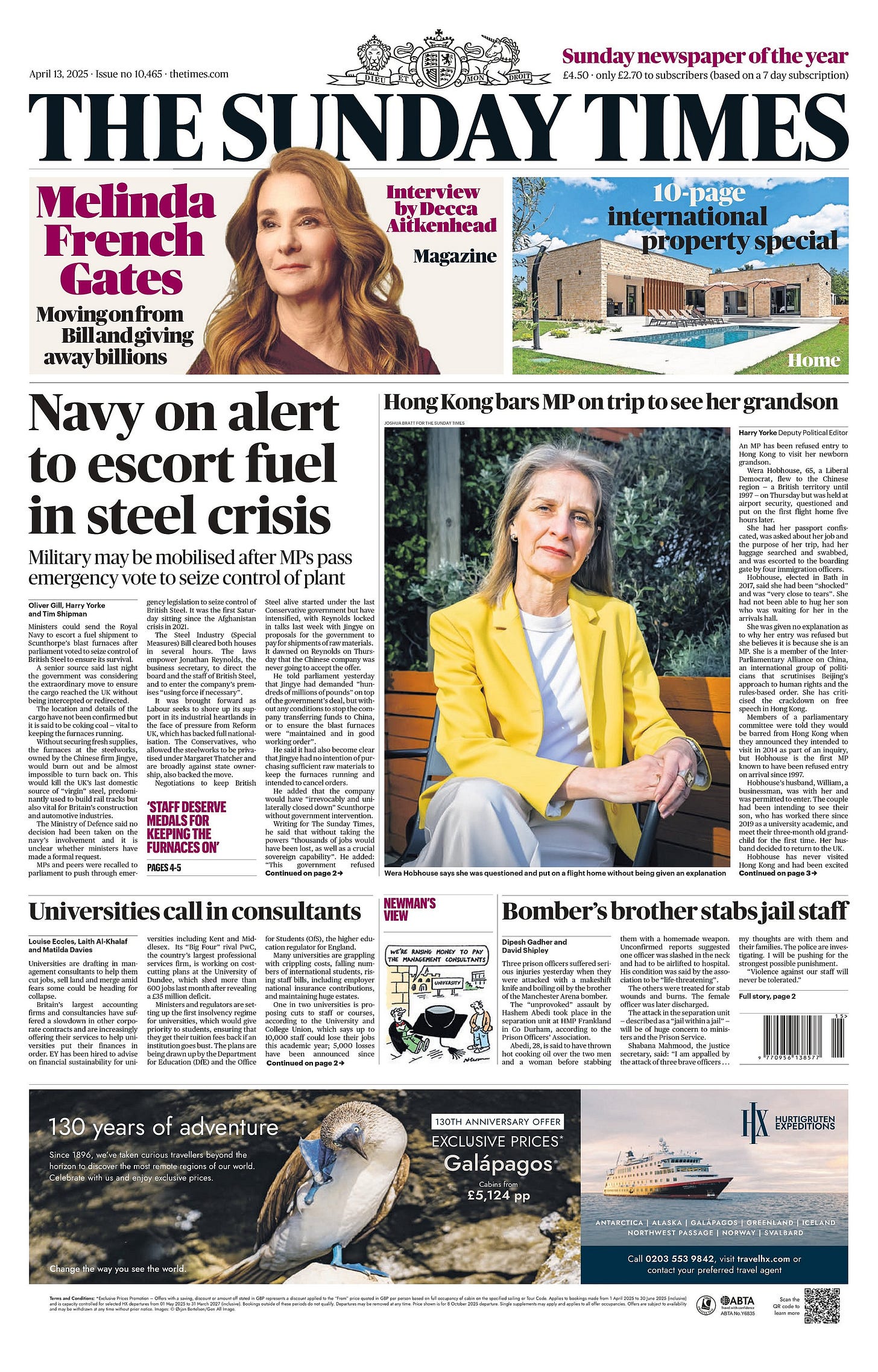Humanitarian Aid Sector Starts Painful Layoffs
Millions Could Die as Aid Dries Up and USAID Disbands

The United Nations’ emergency and disaster response agency will reduce its global workforce by 20% and scale back operations in nine countries, as it confronts a severe funding crisis and escalating global needs, it announced on Friday. In a letter to staff shared on the agency’s website, the Office for the Coordination of Humanitarian Affairs (OCHA) head Tom Fletcher outlined “brutal cuts” driven by a nearly $60 million funding shortfall for 2025, compounded by rising humanitarian demands. OCHA will withdraw from or adjust operations in Cameroon, Colombia, Eritrea, Iraq, Libya, Nigeria, Pakistan, Turkey, and Zimbabwe, and aim to prioritize “dynamic and full responses” in remaining locations where it operates. The agency plans to lay off approximately 500 staff members from its workforce of about 2,600 employees across over 60 countries with a more concentrated presence in fewer locations, according to Najwa Mekki, director of communications at OCHA citing a separate letter Fletcher wrote. The cuts follow months of austerity measures, including a hiring freeze and travel restrictions, which saved $3.7 million. “The humanitarian community was already underfunded, overstretched and literally, under attack. Now, we face a wave of brutal cuts,” Fletcher wrote, emphasizing that the reductions stem from financial constraints rather than diminished needs - CNN
My comment: In short, millions could die needlessly due to deep cuts to the humanitarian aid sector. We've already seen how the response to the Myanmar earthquake was crippled by Trump-era reductions to USAID (The devastating earthquakes have pushed 2 million people into critical need of assistance and protection. This is in addition to the 19.9 million people who were estimated to need humanitarian aid prior to the disaster). Normally a leading presence in such disasters, the U.S. agency was barely visible after thousands were killed last month. Shockingly, at three experienced American first responders were fired shortly after arriving in the country. Cuts to the UN’s Office for the Coordination of Humanitarian Affairs (OCHA) are equally alarming. I’ve worked alongside OCHA’s dedicated professionals, who typically lead disaster responses worldwide. Many of the countries facing OCHA cutbacks—Pakistan, Iraq, Nigeria—are among the most disaster-prone on the planet. With more than 300 million people globally needing humanitarian assistance and protection, the cutbacks will be felt far and wide.
After more than a week of ratcheting up tariffs on products imported from China, the Trump administration issued a rule late Friday that spared smartphones, computers, semiconductors and other electronics from some of the fees, in a significant break for tech companies like Apple and Dell and the prices of iPhones and other consumer electronics. A message posted late Friday by U.S. Customs and Border Protection included a long list of products that would not face the reciprocal tariffs President Trump imposed in recent days on Chinese goods as part of a worsening trade war. The exclusions would also apply to modems, routers, flash drives and other technology goods, which are largely not made in the United States. The exemptions are not a full reprieve. Other tariffs will still apply to electronics and smartphones. The Trump administration had applied a tariff of 20 percent on Chinese goods earlier this year for what the administration said was the country’s role in the fentanyl trade. And the administration could still end up increasing tariffs for semiconductors, a vital component of smartphones and other electronics. The moves were the first major exemptions for Chinese goods, which would have wide-ranging implications for the U.S. economy if they persist. Tech giants such as Apple and Nvidia would largely sidestep punitive taxes that could slash their profits. Consumers — some of whom rushed to buy iPhones this past week — would avoid major potential price increases on smartphones, computers and other gadgets. And the exemptions could dampen additional inflation and calm the turmoil that many economists feared might lead to a recession - NYT
The Gaza Health Ministry has condemning the Israeli military’s attack on al-Ahli Hospital, the last functioning hospital in the north of the Gaza Strip. It said Israeli forces “bombed and destroyed” a building inside the hospital, forcing the evacuation of patients and staff. “We call on international institutions and relevant authorities to protect the health sector in accordance with international laws and agreements,” the statement read. Separately, Clemence Lagouardat, the Gaza City-based humanitarian coordinator of Oxfam says there are growing food shortages across the Gaza Strip after six weeks of total Israeli aid blockade. “The stocks are depleted, even the fuel to cook meals, the wood is becoming also inaccessible”, she told Al Jazeera. “We have been raising the alerts for now days, if not weeks. If the blockade is not lifted, if this common punishment is not lifted, there is very little that, as humanitarian actors, we will be able to do,” she said. “What needs to happen is that the borders need to open again, and supplies need to enter”, Lagouardat said. She added that there is also a lack of drinkable water, which creates an additional risk and leads to people getting sick and even more malnourished - Al Jazeera
Emergency plans to save British Steel’s Scunthorpe blast furnaces by taking control away from Chinese owners were approved by parliament after an extraordinary Saturday sitting. At an historic Commons session – the first Saturday recall since the Falklands war in 1982 – MPs backed wide-ranging moves that will allow ministers to keep the plant working in the hopes a new buyer can be found. Ministers had taken the unusual step of recalling parliament from its Easter recess after negotiations with British Steel’s Chinese owners, Jingye, appeared to break down. Business secretary Jonathan Reynolds accused the firm of planning to “irrevocably and unilaterally” shut the furnaces down by starving them of raw materials – as it emerged that police were called after reports executives were blocked from entering. Although the new law stops short of nationalisation, the government conceded it is “likely” British Steel will have to be taken into public ownership after Sir Keir Starmer warned the UK’s economic and national security was “on the line" - Independent
The US is demanding control of a key pipeline in Ukraine used to send Russian gas to Europe, according to reports, while Kyiv negotiates a minerals deal with the Donald Trump administration. Prospects for a breakthrough in the deal between Washington and Kyiv are scant given the “antagonistic” atmosphere of the talks, a source told Reuters following last week’s meeting. The US has demanded that its International Development Finance Corporation take control of a natural gas pipeline running from the town of Sudzha in western Russia to the Ukrainian city of Uzhhorod. Senior economist Volodymyr Landa told The Guardian Washington's bullying “colonial-type” demands had little chance of being accepted by Kyiv - Independent
British Foreign Secretary David Lammy on April 13 said he was deeply concerned after a UK lawmaker was denied entry to Hong Kong, and said he would be urgently raising the issue with the Chinese authorities. Ms Wera Hobhouse claimed she was the first British MP to be refused entry on arrival in Hong Kong since the former British colony was handed over to China in 1997. Ms Hobhouse is a member of the Inter-Parliamentary Alliance on China. “IPAC unites lawmakers worldwide, promoting democracy and addressing threats to the rules-based and human rights systems posed by the rise of China,” the group says on its website. The Sunday Times newspaper said Ms Hobhouse, 65, flew to Hong Kong on April 10 on a personal trip to visit her newborn grandson. It said she had her passport confiscated, was asked about her job and the purpose of her visit, had her luggage searched and was then taken to the boarding gate. “When I was given the decision my voice was shaking and I was just saying: ‘Why, please explain to me?‘,” the British weekly quoted her as saying. Ms Hobhouse said on Bluesky: “I am the first MP to be refused entry on arrival to Hong Kong since 1997. “Authorities gave me no explanation for this cruel and upsetting blow. I hope the foreign secretary will recognise that this is an insult to all parliamentarians and seek answers.” - AFP






